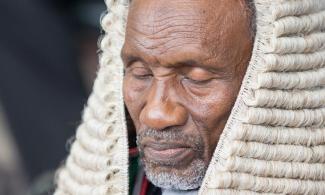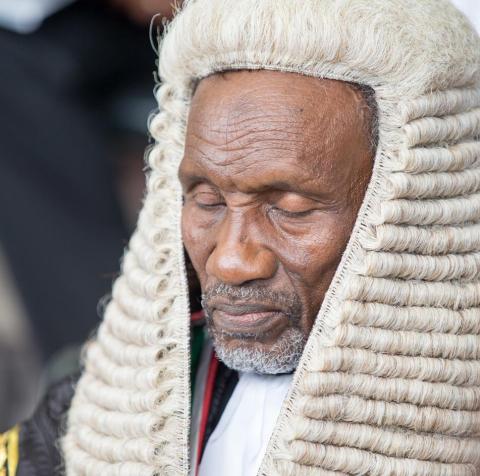
On Thursday, 12th November, 2015 a five-man panel of the Supreme Court of Nigeria led by John Fabiyi, JSC suspended further hearing on the 13-count criminal charge against the Senate President, DR. Olubukola Abubakar Saraki at the Code of Conduct Tribunal (CCT). Dr Saraki acting through his lawyers had urged the Supreme Court for an Order Staying further proceedings in Charge No. CCT/ABJ/01/2015 between FRN V Dr Olubukola Abubakar Saraki pending the determination of the appeal filed before the Supreme Court against the judgment of the Court of Appeal delivered dated 30th October, 2015.

In a short ruling on the issue of stay of proceedings, the Supreme Court held thus: “It is imperative to state that all the parties, including the Code of Conduct Tribunal, should tarry a while to enable this court to determine the appeal before it”.
It is important to note that by the new Administration of Criminal Justice Act, 2015 stay of proceedings in criminal trial is expressly and unambiguously forbidden. Section 306 of the said Act provides: “An application for stay of proceedings in a criminal matter before the court shall not be entertained.” This provision was conspicuously brought to the attention of the Supreme Court. But in what appears to be a tacit attempt to sit on the fence, the apex court deliberately and inexplicably chose not to comment on the validity or efficacy of section 306 ACJ Act, 2015. Instead, the court directed the parties as well as the CCT to “tarry a while”.
The term “stay of Proceedings” as used by the Act and the new terminology of “tarry a while” as introduced by the Supreme Court is, to the mind of this writer, a distinction without a difference.
Irrespective of the terminology adopted, what is obviously clear is that the apex court has by its own hands, whittled down the efficacy of section 306 ACJ Act, 2015.
One is however too afraid that there would come another appeal where the selfsame Supreme Court will strike down the above decision and rather hold that there cannot be a grant of an Order for stay of proceedings in criminal trial. Yes, one would say so because our Supreme Court is over time peculiar with this type of dangerous judicial summersault and our Law Reports are littered with conflicting and contradictory decisions of the court. I shall best illustrate this point with a few previous decisions of the selfsame Supreme Court.
In the case of Abacha V The State reported in (2002) 11 NWLR Pt. 779 at page 437, the Supreme Court, without reversing itself in the other earlier cases where it had already laid down the principle of law on quashing of information, especially the famous case of Ikomi V The State (1986), yet again went ahead to decide the Abacha case against those settled principles. Also, in O. O. M. F Ltd V NACB Ltd reported in NWLR Pt. 1098 at pages 412-438, the Supreme Court held that a court does not have jurisdiction to entertain a matter where appropriate filing fees were not paid. This decision was given in April, 2008.
However, a few months thereafter in the case of Akpaji V Udemba reported in NWLR Pt. 1138 at pages 545-576 the same Supreme Court held that non-payment of filing fees was a mere irregularity and does not affect jurisdiction. One may ask, what then is the law on the point?
This type of judicial summersault especially from our very apex court throws uncertainty into our jurisprudence and makes law practice (litigation) more of a game of chance and less of a science with predictable outcome.
Perhaps, it is necessary at this point to state that under our laws, the Supreme Court is a very powerful court. In fact, this point was made by the Supreme Court itself in the celebrated case of Adigun V Attorney-General of Oyo State No. 2 (1987) 2 NWLR Pt. 56 at pages 214-215 where the court stated thus: “… learned counsel probably rightly, wondered, if the Justices of the Supreme Court were super men.
Let me answer the question. The Supreme Court is, under the Constitution, a Super Court, deliberately meant and made to be so, by the organic law, and the justices of that court, now only to that extent of their decision, are supermen, meant to be so and so meant by the Constitution. Of course, neither the court nor the Justices are meant to, or could even be infallible. But the price paid for finality in litigation is that the notion or the dread of infallibility has been sacrificed by the Constitution on the altar of finality”.
However and regrettably too, it would appear that our Supreme Court has not fully accepted, and with all humility, the Court seems not to fully appreciate the fact that it is indeed a god and whatever it says is Law although it is called Judgment. In practical terms, there is really no difference between a Supreme Court Judgment and Law properly so called.
This being the case, our Supreme Court should always spare no energy and effort in taking advantage of any slightest opportunity presented to it, to clearly espouse and pronounce on the state of our laws, especially as it relates to practice and procedure where Parliament hardly intervenes, and also when it borders on novelty issues of law.
It is submitted, with the greatest respect, that our Supreme Court abdicated its sacred duty when it failed to take advantage of the recent ruling on the Saraki’s case to make a clear-cut, categorical and unequivocal judicial pronouncement on the efficacy and validity of section 306 of the Administration of Criminal Justice Act, 2015. Surely, this has left a sour taste in the mouth of many a trial lawyer, and it does no good to the development of our jurisprudence.
Eno Iyamba, Esq. is a private Legal Practitioner at Basic Rights Counsel (Barristers & Solicitors), Calabar, Cross River State.